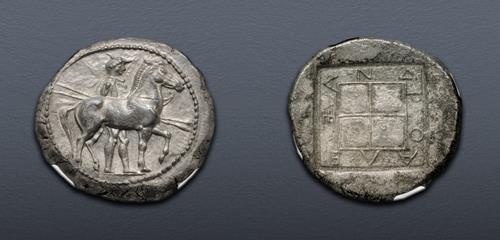
|
KINGS of MACEDON. Alexander I. 498-454 BC. AR Tristater – “Oktadrachm” (29.5mm, 28.30 g, 11h). Light Aeginetic standard. Aigai mint. Struck circa 476/5-460 BC. NGC Ch AU, 5/5, 2/5.
Triton XXVII
Lot: 142. Estimated: $ 10 000
Greek, Silver
Sold For $ 9 250. This amount does not include the buyer’s fee.
Go to Live
|
|
KINGS of MACEDON. Alexander I. 498-454 BC. AR Tristater – “Oktadrachm” (29.5mm, 28.30 g, 11h). Light Aeginetic standard. Aigai mint. Struck circa 476/5-460 BC. Horseman, petasos hanging from neck, holding two spears, standing right, behind horse standing right / AΛE-ΞA-NΔ-PO in shallow incuse square around quadripartite square in relief. Raymond Group II, 51 (A10/P13); AMNG III/2, 31 var. (no crescent); HGC 3, 755; BMC 1 (same obv. die); Dewing 1082 (same obv. die); Pozzi 815 (same dies). Toned. In NGC encapsulation 6709090-001, graded Ch AU, Strike: 5/5, Surface: 2/5.
Ex Leu Numismatik AG 3 (27 October 2018), lot 42 (cleaned since).
By the end of the sixth century BC, the Kingdom of Macedon became an influential regional power, strategically located between the Persian Empire and the city-states of Greece. The wars with Persia further extended Macedon’s importance, especially that of its young prince, Alexander I, son of Amyntas. An astute politician, Alexander succeeded to the throne in 498 BC and deftly maneuvered through this precarious situation as the Persians extended their power and influence into Greece proper. Alexander maintained an aloof but cordial relationship with the Persians as they moved through Thrace and Macedon, forcing other tribes to offer earth and water in tribute. At the same time, he worked towards a stronger association with the Greeks, who still regarded Macedon as semi-barbaric. Herodotos (9.44) says that on the eve of the battle at Plataia, Alexander entered the Athenian camp to report that a delay in engaging the Persians would help to further diminish their already low supplies. In return, he hoped the Greeks (in particular the Athenians) would assist him when the time came, thereby forging a relationship between the rising power in the north with the rising Greek city-states of Athens, Sparta and their allies. In 476 BC he was acknowledged as a full-blooded Greek himself and allowed to participate in the Olympic Games of that year.
Alexander I was the first Macedonian king to strike coins in his own name and likely made use of the silver mines of Mount Dysoron, which he used his Persian connections to obtain early in his reign. His large silver pieces, such as this splendid example, are denominated as tristaters or oktadrachms on the “heavy Thraco-Macedonian standard,” and were evidently intended for trade with the Persians and other Greek states. A lighter weight standard was employed for coins in local situation, a situation which continued down to the time when Macedon became the dominant power in Greece and Asia Minor.
The final winners of all Triton XXVII lots will be determined at the live public sale that will be held on 9-10 January 2024.
Triton XXVII – Session One – Lot 1-337 will be held Tuesday morning, 9 January 2024 beginning at 9:00 AM ET.
Winning bids are subject to a 22.5% buyer's fee for bids placed on this website and 25% for all others.
We recognize that our users may have various Internet Browsers and Operating Systems. We like our visitors to have the best possible experience when using our bidding platform. However, we do recognize that it is impossible to develop applications that work identically, efficiently and effectively on all web browsers. The CNG bidding platform supports the latest stable major version and stable previous version of Chrome and Firefox.
|
